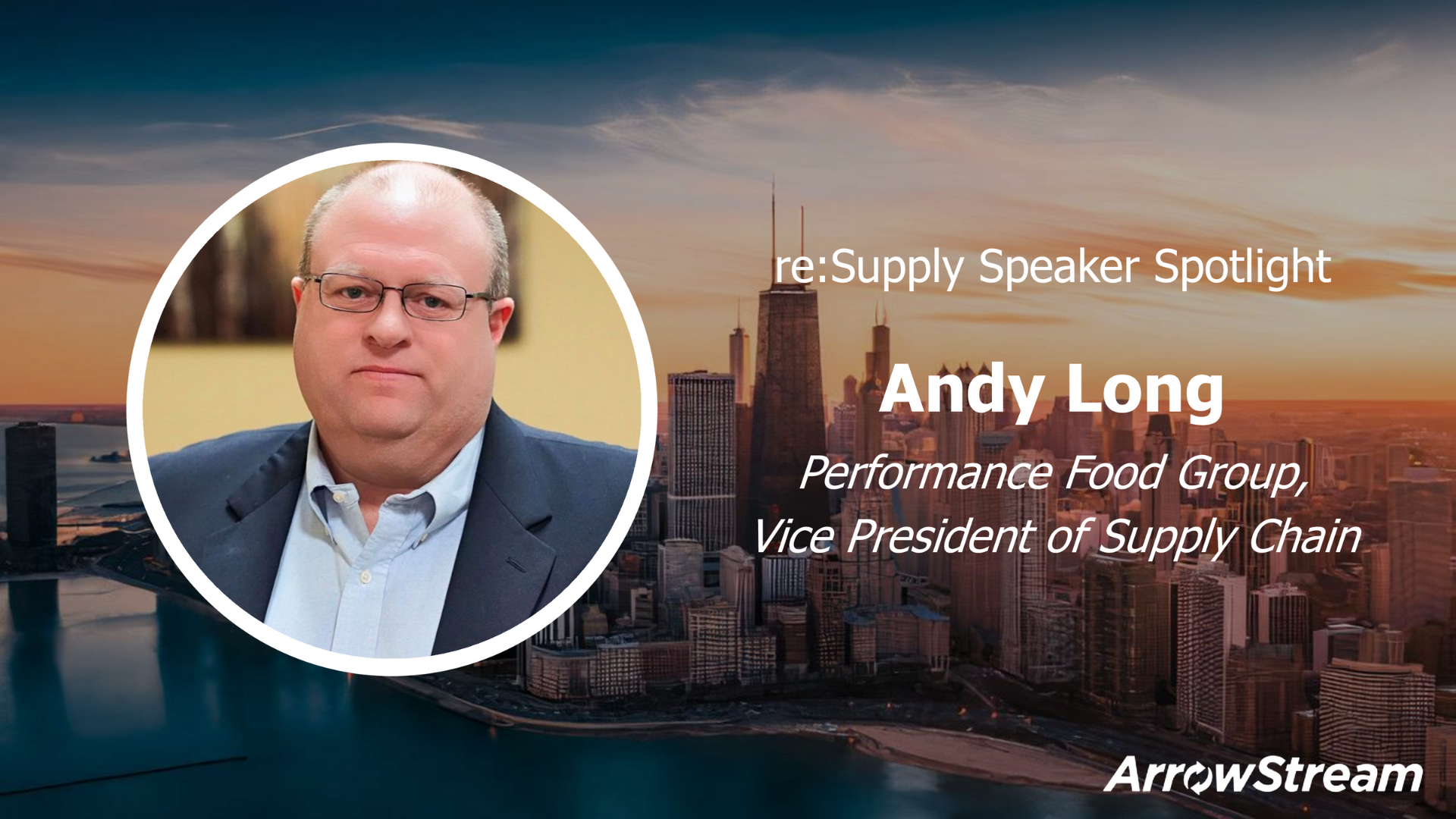
With just over 2 weeks until ArrowStream’s re:Supply Innovation Summit, we’re delighted to present an interview with Andy Long, Vice President of Supply Chain at Performance Food Group. Andy has worked in logistics since 1989 and now has over thirty years of industry experience. He will be part of the panel discussion on ‘Rethinking Data Collaboration’ in which suppliers, distributors, and operators will discuss the pluses and minuses of data collaboration in foodservice supply chain.
1. Could you tell us about yourself? How did you get into the foodservice and how long have you been in the industry?
I am the Vice President of Supply Chain at Performance Food Group, and I've been with them since about 2009. My focus is around inbound logistics, so moving products from points of supply to our various distribution centers across the country. I’ve worked in logistics since 1989 when I first started with a small systems distributor, and I've worked in logistics on and off over most of that time. I’ve also spent a short period of time in manufacturing.
2. What has changed about the foodservice industry since you started?
Since I started, the changes are more focused on trying to close the time windows. It’s become more important to reduce the time between when somebody has a request or an idea for a product that they want to sell, promote, or offer through their system, to the time that we're able to deliver it to the stores. Before there would be some sort of a calendar. They would say at the beginning of the year that they're working on specific items for the second half of the year with the manufacturers, suppliers, and distributors. Throughout my career I've seen that time window continuously shrink to the point where we have literally just a few weeks, maybe even one week’s notice. In the last couple of years, during the pandemic, not only are timetables tight, but there’s a risk that the supplier won’t have the product, even if they confirm your purchase order. You may show up and they don't have labor in their warehouse to load the trucks, or they're behind schedule with loading trucks that were there before you. Carriers are dealing with all kinds of issues so when you order a truck, it may not be available at the time that you expect it to be there. You run into issues, even in your own facilities at times. There are labor issues especially if you have an outbreak of Covid.
3. How do you think technology has impacted the industry?
The first is just the data itself, being able to understand and make sense of what it's telling you, what's available in terms of product, and having visibility into your supply chain. The second thing is what you can do with it, what actionable steps you are able to implement to change your business for the better. Technology has allowed for a heightened visibility of business processes and the ability to use this information for improvement.
When it comes to ArrowStream’s technology, we use ArrowStream’s Crossbow throughout a large portion of our company. We use it to look not only at historical data and movement, but to build plans of how we're going to handle the inbound flow of products coming into our facilities. It’s very helpful to us in terms of organizing the data, and then putting in place some type of plan to act with that data.
5. What’s your favorite thing about working in foodservice and how do you think working in foodservice differs from other industries?
Well, I've always been told everyone's got to eat. There are a couple of factors – job security, knowing the skill set that you have is going to be used somewhere, as well as knowing that you're feeding a large number of people, and a large number of people are counting on the work that you do.
6. What’s the biggest obstacle you’ve faced in your career so far?
Covid is by far the biggest obstacle we’ve seen because it's been so disruptive in so many ways and it’s so unpredictable. There's always been things like bird flus, transportation shortages, driver shortages, and labor issues at certain facilities. Those are all challenging enough to deal with, but nothing has been as directly disruptive and as widespread as Covid itself and the associated supply chain elasticity, as the supply chain bounces back and stretches tighter. It has really been unprecedented.
6. Where do you believe things are headed with the future of the supply chain in 2022 and beyond?
For the short term, I think we're seeing some improvement in carrier capacities and some improvement in labor. Both of those things are going to allow manufacturers to catch up a bit. However, we could have another outbreak of Covid. There’s also inflation and a number of geopolitical issues such as the war in Ukraine. There’s no telling how disruptive that might be on certain commodities and imports for both raw materials and finished product. My guess is that these problems will slow down a bit so that hopefully the foodservice supply chain will improve over the next six months. We are seeing some improvement in a number of areas already, hopefully that continues.
6. Is there a company or a person you admire and why?
There are a lot of people. PFG because that's where I work. It sounds very self-serving but, honestly, I have to say that. They’ve done a great job of managing through all the things that are going on and have been very flexible with our suppliers, customers, employees, and associates to ensure that we have the tools and resources we need to do our job. I really admire our company's leadership and what they've done to get us through this.
To hear more from Andy and learn from his experience, request your invite to re:Supply here.
